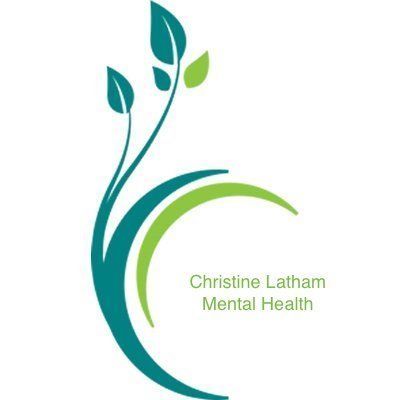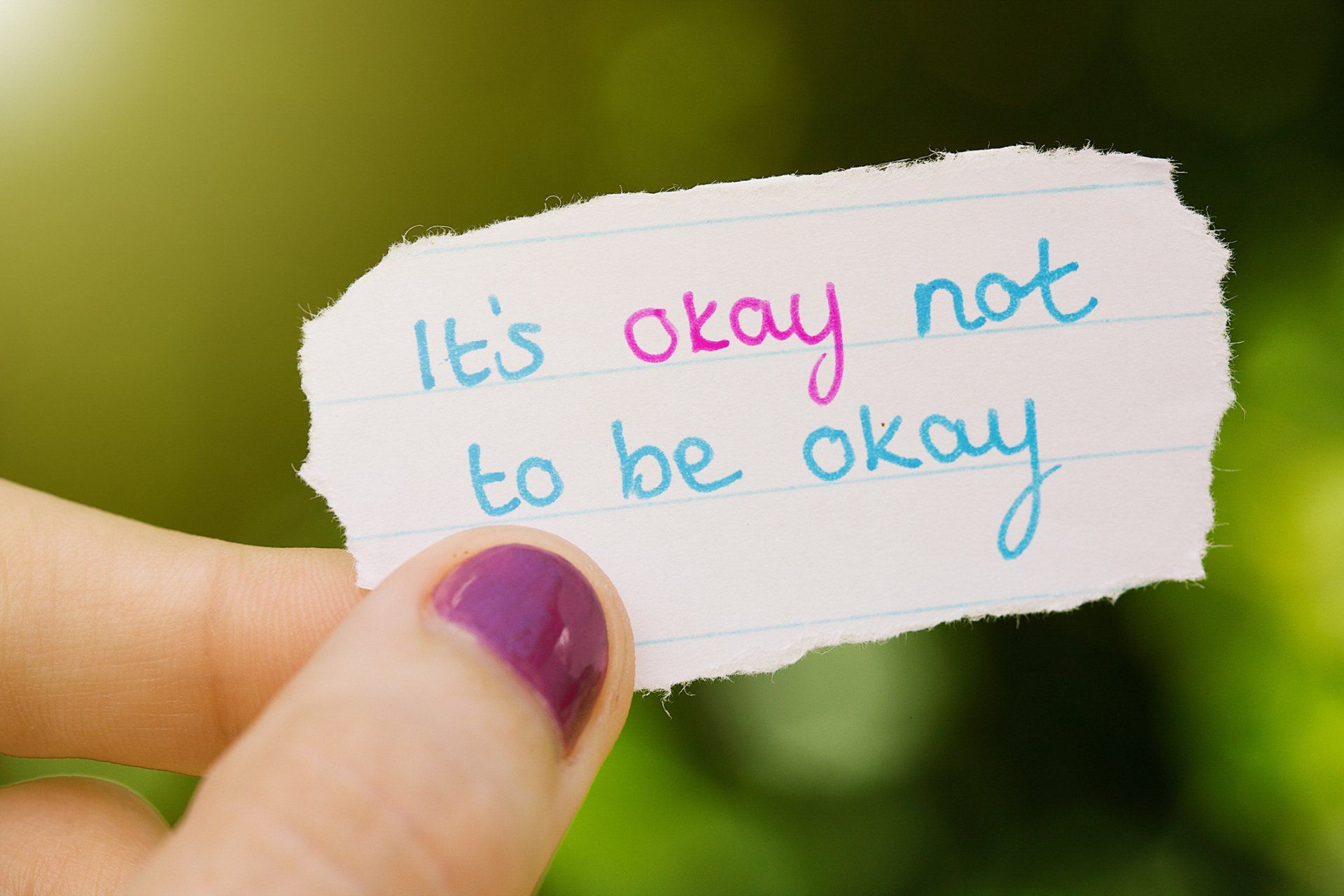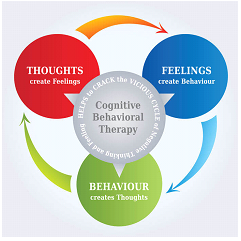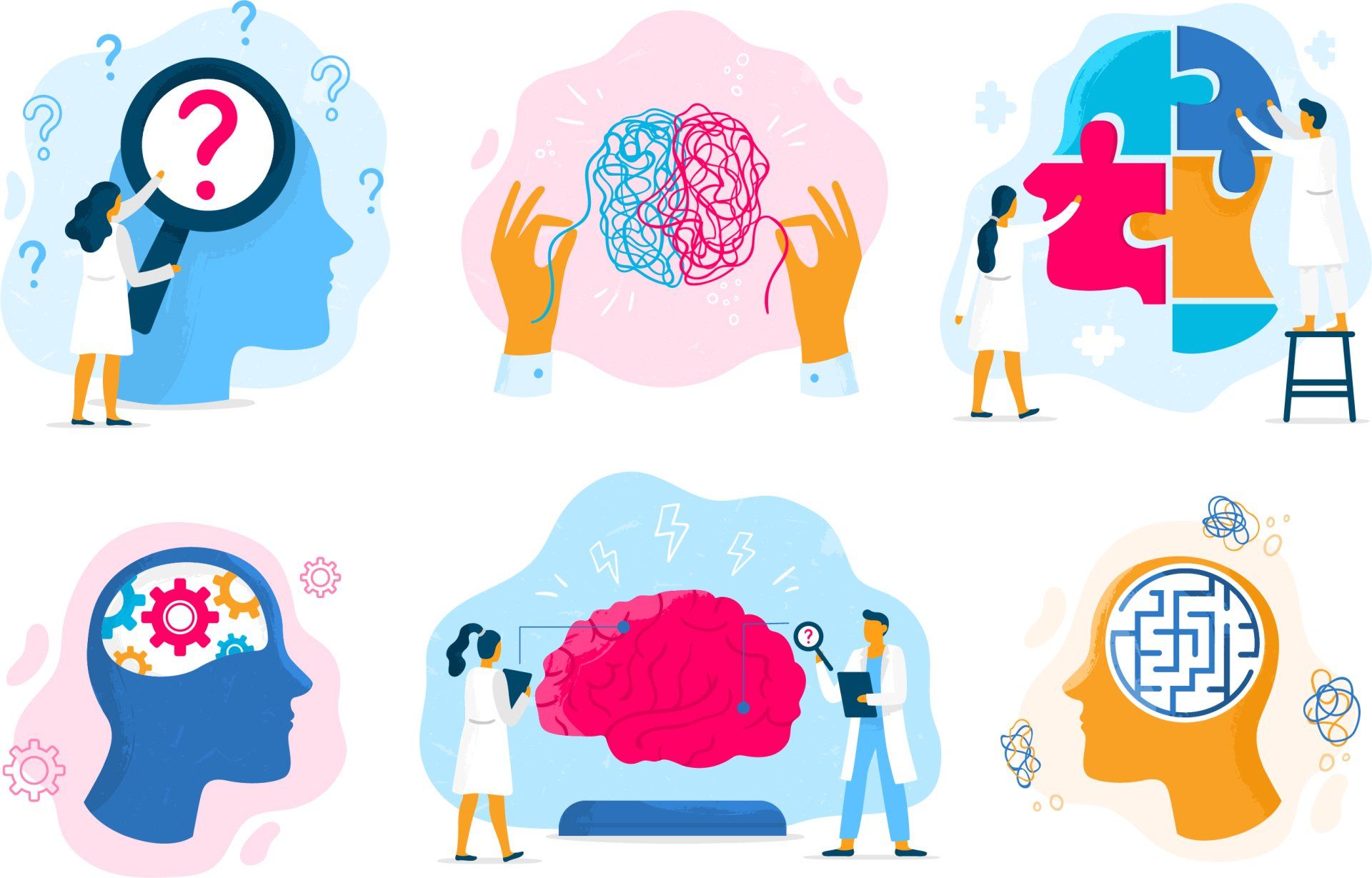In CBT, problems are broken down into five main areas:
- Situations
- Thoughts
- Emotions
- Physical feelings
- Actions
CBT is based on the concept of these five areas being interconnected and affecting each other. For example, your thoughts about a certain situation can often affect how you feel both physically and emotionally, as well as how you act in response.
What can CBT help with?
NICE recommends CBT in the treatment of the following conditions:
- Anxiety Disorders- Panic Disorder (including panic attacks), General Anxiety Disorder( Worry) Health Anxiety (Hypochondriasis), Trauma, Complicated Trauma (Childhood Abuse) and PTSD ( post-traumatic stress disorder)
- Depression
- Obsessive Compulsive Disorder
- Bipolar Disorder
There is also good evidence that CBT is helpful in treating many other conditions, including:
- Chronic fatigue
- Behavioural difficulties in children and young people
- Anxiety disorders in children and young people
- Chronic pain
- Physical symptoms without a medical diagnosis
- Sleep difficulties
- Anger management
How CBT is different from other therapies
CBT differs from many other psychotherapies because it's:
- Pragmatic – it helps identify specific problems and tries to solve them
- Highly structured – rather than talking freely about your life, you and your therapist discuss specific problems and set goals for you to achieve
- Focused on current problems
- Collaborative – I won't tell you what to do; I will work with you to find solutions to your current difficulties
Stopping negative thought cycles
There are helpful and unhelpful ways of reacting to a situation, often determined by how you think about them. The world as may you perceive it to be may not be based on realistic expectations but biased by the way you think and behave.
For example, if your marriage has ended in divorce, you might think you've failed and that you're not capable of having another meaningful relationship. This could lead to you feeling hopeless, lonely, depressed and tired, so you stop going out and meeting new people. You become trapped in a negative cycle, sitting at home alone and feeling bad about yourself.
CBT could help you to come to understand that you do not have to accept this way of thinking you could accept that many marriages end, learn from your mistakes and move on, and feel optimistic about the future.
This optimism could result in you becoming more socially active and you may start evening classes and develop a new circle of friends. This is a simplified example, but it illustrates how certain thoughts, feelings, physical sensations and actions can trap you in a negative cycle and even create new situations that make you feel worse about yourself.
CBT aims to stop negative cycles such as these by breaking down things that make you feel bad, anxious or scared. By making your problems more manageable, CBT can help you change your negative thought patterns and improve the way you feel.
CBT can help you get to a point where you can achieve this on your own and tackle problems without the help of a therapist.
CBT sessions
Usually we will arrange to meet for between five and 20 weekly or fortnightly sessions, with each session lasting 50 minutes.
Exposure therapy sessions usually last longer to ensure your anxiety reduces during the session. The therapy may take place:
- In a clinic
- Outside – if you have specific fears there
- In your own home – particularly if you have agoraphobia or OCD involving a specific fear of items at home
- Via Microsoft teams or Zoom
Some people prefer using a computer rather than talking to a therapist about their private feelings. However, you may still benefit from occasional meetings or phone calls with a therapist to guide you and monitor your progress.
The first few sessions will be spent making sure CBT is the right therapy for you, and that you're comfortable with the process. I will ask questions about your life, background and how your presenting problem interferes with your family, work and social life. I will ask about events that may be related to your problems, treatments you have previously had, and what you would like to achieve through therapy.
If CBT seems appropriate, I will let you know what to expect from a course of treatment. If it's not appropriate, or you don't feel comfortable with it, then I can recommend alternative treatments.
After the initial assessment period, you'll start working with your therapist to break down problems into their separate parts. To help with this, I may ask you to keep a diary or write down your thoughts and behaviour patterns.
We will analyse your thoughts, feelings and behaviours to work out if they're unrealistic or unhelpful and to determine the effect they have on each other and on you. I will be able to help you work out how to change unhelpful thoughts and behaviours.
After working out what you can change, I will ask you to practise these changes in your daily life. This may involve:
- Questioning upsetting thoughts and replacing them with more helpful ones
- Recognising when you're going to do something that will make you feel worse and instead doing something more helpful
You may be asked to do some "homework" between sessions to help with this process.
Confronting fears and anxieties can be very difficult. I will not ask you to do things you don't want to do and will only work at a pace you're comfortable with. During your sessions, I will check you're comfortable with the progress you're making and ask you if there are any concerns or if there is something specific you wish to address that session.
One of the biggest benefits of CBT is that after your course has finished, you can continue to apply the principles learned to your daily life. This should make it less likely that your symptoms will return.
BABCP stands for the British Association for Behavioural & Cognitive Psychotherapies. It has been the lead organisation for CBT in the UK since 1972. BABCP members work in the NHS, social care, education and universities. BABCP also provides accreditation to those who practise CBT in the NHS and privately. It is widely recognised by health and social care employers, training institutions and health insurance companies. BABCP believes that accreditation is important in protecting the public and raising the quality of CBT.
Contact BABCP
Imperial House, Hornby Street, Bury BL9 5BN
babcp@babcp.com
0161 705 4304
www.Samaritans.org - Tel 116 123
www.Mind.org.uk - Tel 0300 123 3393
www.Samaritans.org - Tel 116 123 | www.Mind.org.uk - Tel 0300 123 3393 | www.kooth.com
2 Hornbeam Close Sale M33 5LJ | 07805 404145 | christinelathamcbtemdr@outlook.com
Christine Latham CBT EMDR | Privacy Policy






